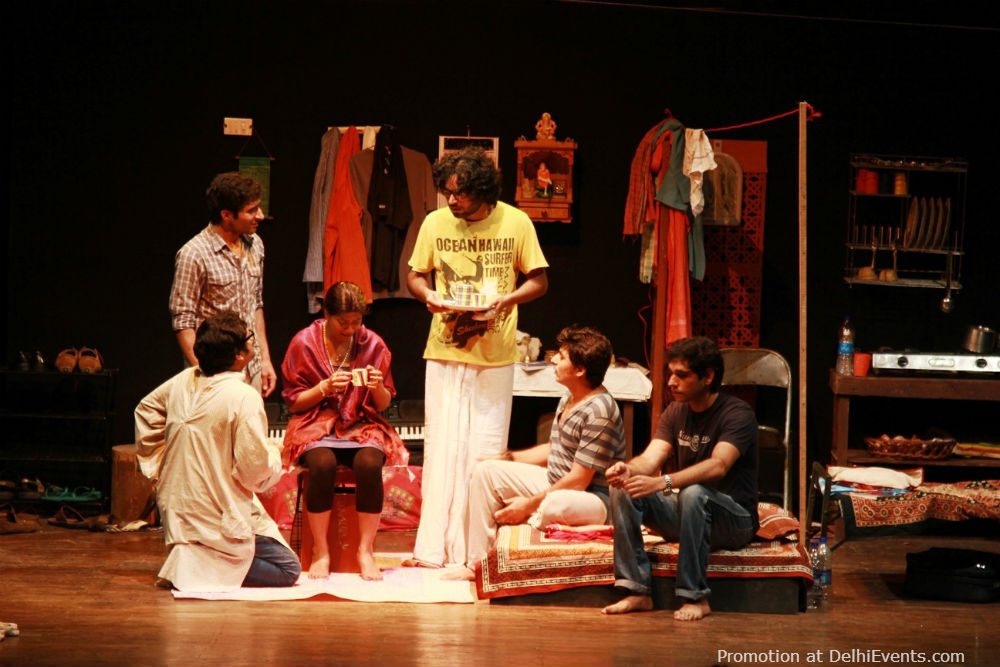
A Hope And A Prayer
by Deepa Gahlot February 2 2018, 4:21 pm Estimated Reading Time: 3 mins, 32 secsShowbusiness is about success and stardom, but failure has its place too—if there is a top of the ladder, there has to be bottom rung as well...
In Mumbai, there is a unique community of ‘strugglers’ that bands together, lives in low-rent areas, keeps track of casting opportunities, and forms a support system for others like them who flock to Bollywood city every day, carrying with them a little money, a contact number and the expectations of their families. (The rich aspirants get their parents to fund their films, or at least their lavish lifestyles so they are not strugglers in the real sense of the term.)

Source :Delhi Events
Nadira Zaheer Babbar’s play Yeh Hai Bombay Meri Jaan, that opened a few years ago and is still going strong, is about five such men, sharing a one-room flat in one of the numerous decrepit tenements in the suburbs. One of them is a writer, one is an aspiring music composer and three are actors, who do some theatre till that big film or TV role lands their way. The set design is perfect—a shabby flat in which they sprawl on the floor, a tiny kitchen that is seldom stocked, a clothesline across the room, a small mirror for some quick preening and a temple. Water has to be quickly filled before it runs out, when the roof leaks, a bucket is placed under the drip, and with Mumbai practicality, a dirty T-shirt and soap tossed into it—why waste precious water! Whoever has money that day, lends to the one who doesn’t. And any clean piece of underwear is up for grabs in a hurry. Their cell phone ring tones give some indication of where they come from and what they believe in—they haven’t yet reached the level of despair where they don’t believe in anything.

Source :Explara
Nadira Babbar, both in her capacity as the head of theatre group Ekjute, and the wife of Raj Babbar, has seen the struggler phenomenon up close, and she says everything about the play is from her own experience of interacting with them. Her observation of their life in their untidy little hole-in-the-wall is bang on—the excitement when something works out, the dejection with repeated failure, the fake optimism conveyed to families over the phone, the inability to be attend family functions (how can they face people back home unless they have something to show for their time in Mumbai?) and the scraping for survival. The landing up at friends’ homes at meal times to cadge free food. The keeping up pretences, the ignoring of humiliation, dropping portfolios at production and casting offices and waiting for luck to change.
Her play is only about men, with female strugglers it’s a completely different, and sometimes sordid world of compromise. There’s another play there, one that many may not want to see.
Source :Google_Plus
Babbar’s buoyant five somehow keep bitterness at bay and take each day as it comes. But in real life, unless there is a sudden breakthrough in an audition and a good part offered, the dreams slowly start crumbling. From expecting to be cast as “hero” in a film and looking down on television, when money and hope runs out, they will accept just about anything, even a bit part in a serial, but always waiting for a miracle to happen. Didn’t Shah Rukh start his career on TV? And now Sushant Singh Rajput? So there is still a chance… Every spot boy, tea boy, junior artiste, light boy or stuntman had once come to Mumbai to become a star and then took whatever they got to stay close to the action—who knows when some filmmaker might discover them?
A play about disillusionment, never reaches the lows of despair—if confidence and self-belief were to be wiped out, showbusiness would have trouble surviving too.




-173X130.jpg)

-173X130.jpg)
-173X130.jpg)

-173X130.jpg)
-173X130.jpg)
-173X130.jpg)